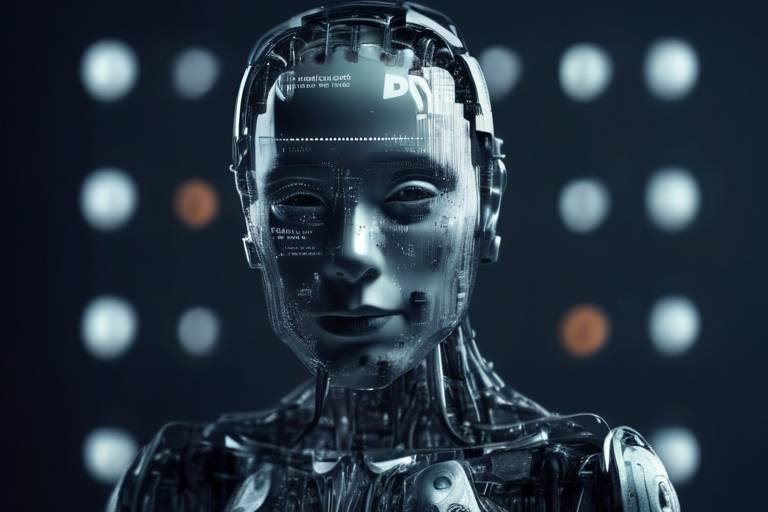Balancing the Scales: AI and Ethics
In a world increasingly dominated by technology, the intersection of artificial intelligence (AI) and ethics has become a hot topic of discussion. As AI systems evolve, they bring with them a plethora of opportunities and challenges that we must navigate carefully. Just imagine AI as a double-edged sword: on one side, it offers incredible advancements in efficiency, productivity, and even creativity; on the other side, it presents ethical dilemmas that could shape the future of society in profound ways. The importance of responsible AI development cannot be overstated, as it holds the key to ensuring that these technologies serve humanity rather than undermine our values.
As we delve deeper into this topic, we will explore the various ethical dilemmas that arise with AI technologies, including issues of bias, privacy, and accountability. These challenges are not just abstract concepts; they affect real lives and can lead to significant societal implications. For instance, think about the algorithms that determine loan approvals or job applications. If these systems are not designed with ethics in mind, they can perpetuate existing inequalities and create new forms of discrimination. Therefore, understanding these challenges is crucial for ensuring that AI systems are developed and deployed responsibly.
Moreover, the conversation around AI and ethics is not just for tech enthusiasts or industry experts; it’s a dialogue that involves everyone. From policymakers to everyday users, we all have a stake in how AI technologies are created and used. As we move forward, we must foster a culture of ethical AI development that prioritizes fairness, transparency, and accountability. This means not only addressing the current challenges but also anticipating future ethical dilemmas that may arise as AI continues to evolve. In essence, the future of AI hinges on our ability to balance these scales, ensuring that we harness its potential while safeguarding our ethical standards.

The Ethical Dilemmas of AI
As we stand on the brink of an unprecedented technological revolution, the rise of artificial intelligence (AI) brings with it a myriad of ethical dilemmas that cannot be ignored. Imagine a world where machines make decisions that impact our lives—sounds futuristic, right? But it’s happening now. From self-driving cars to automated hiring processes, AI technologies are becoming integral to our daily existence. However, with great power comes great responsibility, and the ethical implications of AI are as vast as they are complex.
One of the most pressing issues is bias. AI systems are only as good as the data they are trained on. If the data is flawed or biased, the outcomes can be discriminatory and unfair. This can lead to significant consequences, such as wrongful arrests based on biased facial recognition software or biased loan approvals that disproportionately affect certain communities. The stakes are high, and understanding the roots of these biases is crucial for developing fair and just AI systems.
Another major concern revolves around privacy. In a world where data is the new oil, AI systems often require vast amounts of personal information to function effectively. This raises the question: how much of our privacy are we willing to sacrifice for convenience? The implications of data breaches are severe, and as AI continues to evolve, so too must our approaches to safeguarding personal information. It’s essential to strike a balance between innovation and privacy, ensuring that individuals retain control over their data.
Accountability is yet another ethical dilemma. When an AI system makes a mistake, who is held responsible? Is it the developers who created the algorithm, the organization that deployed it, or the regulatory bodies that failed to oversee its ethical implications? Establishing clear lines of accountability is critical to ensure that AI technologies are used responsibly and ethically. Without this, we risk entering a realm where machines operate without oversight, leading to potentially catastrophic outcomes.
In summary, the ethical dilemmas posed by AI are multifaceted and require urgent attention. As we continue to integrate AI into various aspects of society, it’s imperative that we engage in discussions about these challenges. By fostering a culture of ethical AI development, we can navigate the complexities of this technology while safeguarding our values and principles.
- What are the main ethical dilemmas associated with AI? The primary dilemmas include bias in algorithms, privacy concerns, and accountability in AI development.
- How can bias in AI be mitigated? Techniques such as using fairness-aware algorithms and conducting regular audits can help reduce bias in AI systems.
- Why is privacy a concern in AI? AI systems often require large amounts of personal data, raising questions about how this data is collected, stored, and used.
- Who is responsible when AI makes a mistake? Accountability can be complex, involving developers, organizations, and regulatory bodies.

Bias in AI Algorithms
Bias in AI algorithms is a pressing concern that can lead to unfair outcomes and systemic discrimination across various sectors. Imagine a world where your job application is filtered out not because of your qualifications, but due to the biases embedded in the algorithms that assess them. This is not just a hypothetical scenario; it is a reality that many individuals face today. Understanding the sources of bias is crucial, as it allows us to address the underlying issues and work towards creating more equitable AI systems.
At its core, algorithmic bias arises from flawed data or design choices made during the development process. When we feed AI systems with data that reflects historical inequalities or societal prejudices, the algorithms learn to replicate these biases. This can manifest in several ways, including facial recognition systems that misidentify individuals from certain demographic groups, or lending algorithms that unfairly disadvantage applicants based on race or gender. The implications of these biases are profound, affecting not only individual lives but also reinforcing broader societal inequities.
To tackle the issue of algorithmic bias, we first need to understand its origins. Bias can creep into AI systems through various channels, including:
- Data Quality: Poor quality or incomplete data can skew results and lead to biased outcomes.
- Data Representation: If the data used to train AI systems lacks diversity, it may not accurately reflect the population it serves.
- Design Choices: The decisions made by developers regarding which features to include can inadvertently introduce bias.
By recognizing these factors, we can better address the consequences of bias and work towards creating more inclusive AI systems. For instance, a proactive approach to data collection can help ensure that datasets are representative of the diverse populations they impact.
The quality and representation of data are pivotal in mitigating bias in AI algorithms. Imagine trying to bake a cake with spoiled ingredients; the outcome will undoubtedly be disastrous. Similarly, if the data fed into AI systems is flawed or lacks diversity, the results will be skewed. Ensuring that datasets are not only large but also diverse and accurate is essential for achieving fair AI outcomes. This means actively seeking out underrepresented groups in the data and making adjustments as necessary to create a more comprehensive dataset.
Fortunately, several techniques exist to help mitigate bias in AI systems. These include:
- Fairness-aware algorithms: These algorithms are designed to minimize bias by considering fairness as a fundamental criterion during their operation.
- Regular audits: Conducting audits of AI systems can help identify and rectify biases that may have gone unnoticed during the development phase.
Implementing these strategies not only helps in creating more inclusive AI systems but also fosters trust among users. When individuals know that the technology they interact with has been designed with fairness in mind, it can significantly enhance their confidence in AI applications.
In conclusion, addressing bias in AI algorithms is not just a technical challenge; it is a moral imperative. As we continue to integrate AI into various aspects of our lives, we must prioritize the development of fair and equitable systems. By understanding the sources of bias, ensuring high-quality and representative data, and employing effective mitigation techniques, we can work towards a future where AI serves all of humanity equitably.
Q: What is algorithmic bias?
A: Algorithmic bias refers to systematic and unfair discrimination that occurs when AI algorithms produce results that are prejudiced due to flawed data or design choices.
Q: How can we identify bias in AI systems?
A: Bias can often be identified through testing and auditing AI systems, examining their outcomes across different demographic groups, and checking for discrepancies in results.
Q: What are some examples of bias in AI?
A: Common examples include facial recognition systems misidentifying individuals from certain racial backgrounds or hiring algorithms that favor candidates based on gender or ethnicity.
Q: What can be done to reduce bias in AI?
A: Reducing bias can involve using fairness-aware algorithms, ensuring diverse and high-quality datasets, and conducting regular audits to identify and correct biases.

Understanding Algorithmic Bias
Algorithmic bias is a term that has gained significant attention as we increasingly rely on artificial intelligence (AI) in various aspects of our lives. Imagine walking into a store, and the AI system that decides what products you see is influenced by historical data that favors certain demographics while ignoring others. This is a classic example of how bias can seep into AI algorithms, leading to unfair outcomes. Understanding the roots of this bias is essential for creating equitable systems that serve everyone fairly.
At its core, algorithmic bias arises from two primary sources: flawed data and poor design choices. Flawed data can include anything from incomplete datasets to those that are not representative of the population. For instance, if an AI model is trained predominantly on data from a specific geographic region, it may not perform well for individuals from different backgrounds. This lack of representation can perpetuate stereotypes and lead to decisions that unfairly disadvantage certain groups.
Moreover, design choices also play a crucial role in fostering bias. Developers might unintentionally embed their own biases into algorithms through the way they structure problems or select features. This is akin to a chef who, despite their best intentions, uses stale ingredients in a recipe, resulting in a dish that doesn’t taste quite right. In the same way, if developers do not critically assess the inputs and frameworks they use, the outcome can be skewed.
To tackle the issue of algorithmic bias, it’s vital to adopt a multifaceted approach. Here are some strategies that can help:
- Data Quality Assessment: Regularly evaluate the datasets used for training AI models to ensure they are comprehensive and representative.
- Diverse Team Composition: Encourage diversity among teams developing AI technologies to bring various perspectives into the design process.
- Bias Audits: Implement routine audits of algorithms to identify and rectify biases that may have developed over time.
By addressing the sources of algorithmic bias, we can create AI systems that are not only more effective but also more just. It’s essential to recognize that the responsibility doesn’t lie solely with developers; organizations and regulatory bodies must also play their part in fostering an environment where ethical AI can thrive.

Data Quality and Representation
When we talk about data quality and representation in the realm of artificial intelligence, we are essentially discussing the foundation upon which AI systems are built. Imagine trying to construct a skyscraper using sand instead of concrete; the results would be disastrous. Similarly, if the data fed into AI algorithms is flawed or biased, the outcomes can be equally catastrophic. High-quality data is not just a luxury; it is a necessity for developing AI that is both effective and fair.
Data quality encompasses several dimensions, including accuracy, completeness, consistency, and timeliness. Each of these factors plays a critical role in ensuring that the AI systems can learn from the data effectively. For instance, if the data is inaccurate, the AI might learn incorrect patterns, leading to erroneous predictions and decisions. In addition, if the dataset is incomplete, the AI model may not capture the full spectrum of scenarios it will encounter in the real world, which can result in significant performance issues.
Furthermore, representation is equally pivotal. It refers to how well the data reflects the diversity of the population it is meant to serve. If certain groups are underrepresented in the dataset, the AI may develop a skewed understanding of reality, leading to biased outcomes. For example, consider a facial recognition system trained predominantly on images of individuals from one ethnic background; it may perform poorly when identifying individuals from other backgrounds. This not only raises ethical concerns but can also have serious real-world implications, including discrimination.
To mitigate these issues, organizations must prioritize the following practices:
- Diverse Data Collection: Actively seek to gather data from a variety of sources to ensure diverse representation.
- Regular Data Audits: Periodically review datasets for quality and representation, making necessary adjustments to improve accuracy.
- Incorporate Community Input: Engage with communities to understand their needs and perspectives, ensuring that the data reflects their realities.
In conclusion, the intersection of data quality and representation is a crucial factor in developing responsible AI systems. By focusing on these elements, we can create AI that not only performs well but also serves society equitably. Addressing these challenges requires a collective effort from developers, organizations, and stakeholders to ensure that AI technologies are built on solid ground.
- What is data quality in AI? Data quality refers to the accuracy, completeness, consistency, and timeliness of the data used in AI systems.
- Why is representation important in AI? Representation is important because it ensures that AI systems understand and can serve diverse populations fairly, preventing biased outcomes.
- How can organizations improve data quality? Organizations can improve data quality by conducting regular audits, ensuring diverse data collection, and engaging with communities for input.

Mitigation Techniques
As we delve into the world of artificial intelligence, one of the most pressing issues we face is the challenge of algorithmic bias. Fortunately, there are several effective that can help ensure AI systems are fairer and more equitable. It's like trying to straighten out a crooked picture frame; you need the right tools and approach to get it just right. Let's explore some of these techniques in detail.
One of the primary methods to combat bias is the use of fairness-aware algorithms. These algorithms are designed to actively consider fairness during the decision-making process. By incorporating fairness constraints, we can guide the AI to make decisions that are less likely to favor one group over another. For instance, in hiring algorithms, fairness-aware techniques can help ensure that candidates from different backgrounds are evaluated on equal footing, rather than being disadvantaged by historical data biases.
Another crucial aspect of mitigating bias is conducting regular audits of AI systems. Think of it as going for a regular health check-up; it’s essential to monitor the performance and fairness of AI models over time. Regular audits can help identify any emerging biases that may not have been apparent during the initial development phase. This proactive approach allows developers to make necessary adjustments before the AI is deployed in real-world scenarios.
Moreover, diverse training datasets are vital in the fight against bias. By ensuring that the data used to train AI systems is representative of various demographics, we can significantly reduce the risk of biased outcomes. This means actively seeking out data from underrepresented groups and ensuring that the AI learns from a wide range of experiences. After all, an AI trained on a narrow dataset is like a student who only reads one book; their understanding of the world will be limited.
Additionally, the implementation of transparent reporting practices can help stakeholders understand how AI systems make decisions. By providing clear explanations of the algorithms and the data they use, organizations can foster trust and accountability. This transparency not only helps users feel more comfortable with AI technologies but also encourages developers to be more diligent in their practices.
In summary, while the challenge of bias in AI is significant, it is not insurmountable. By employing fairness-aware algorithms, conducting regular audits, ensuring diverse training datasets, and maintaining transparent reporting practices, we can work toward building AI systems that are not only intelligent but also ethical. As we continue to innovate in the field of artificial intelligence, let’s keep these mitigation techniques at the forefront of our development efforts to create a more just and equitable future.
- What is algorithmic bias? Algorithmic bias refers to systematic and unfair discrimination that can occur in AI systems due to the data they are trained on or the algorithms themselves.
- How can fairness-aware algorithms help? Fairness-aware algorithms actively incorporate fairness constraints to ensure that decisions made by AI systems do not favor one demographic group over another.
- Why are regular audits important? Regular audits help identify biases that may develop over time, allowing for timely adjustments to AI systems before they are deployed.
- What role does data diversity play? Diverse training datasets ensure that AI systems learn from a wide range of experiences, reducing the risk of biased outcomes.

Accountability in AI Development
In the rapidly evolving landscape of artificial intelligence, establishing accountability is not just a necessity; it's a moral imperative. As AI systems become more integrated into our daily lives, the question arises: who is responsible when things go wrong? The answer isn't as straightforward as one might think. Accountability in AI development involves a complex interplay of developers, organizations, and regulatory bodies, all of whom play crucial roles in ensuring that AI technologies are not only effective but also ethical.
First and foremost, developers are on the front lines of AI creation. They are the architects of the algorithms and systems that power AI technologies. This means they must possess a deep understanding of both the technical aspects of AI and the ethical implications of their work. It’s essential for developers to be trained not just in coding, but also in ethical reasoning. Imagine a chef who knows how to cook but has no idea about food safety; similarly, an AI developer without ethical training can inadvertently create systems that cause harm.
Organizations, on the other hand, have a broader responsibility. They must foster a culture of accountability that permeates every level of their operations. This includes implementing robust internal policies that prioritize ethical AI use and ensuring that their teams are equipped with the necessary resources to uphold these standards. In many ways, organizations act as the guardians of AI ethics. They can establish ethical review boards that evaluate AI projects before they go live, ensuring that potential risks are identified and addressed. Furthermore, organizations should be transparent about their AI systems, openly communicating how these technologies work and the data they rely on.
Regulatory bodies also play a pivotal role in shaping the landscape of AI accountability. They are responsible for creating laws and guidelines that govern AI technologies, ensuring that developers and organizations adhere to ethical standards. However, the challenge lies in keeping up with the rapid pace of AI development. Regulations must be adaptable and forward-thinking to address the unique challenges posed by AI. For instance, the European Union has made significant strides with its AI Act, aiming to create a framework for trustworthy AI. But, as we know, legislation often lags behind innovation, which raises the question: how can we ensure that regulations remain relevant?
To tackle these challenges, collaboration among all stakeholders is essential. Developers, organizations, and regulators must engage in ongoing dialogue to share insights, best practices, and lessons learned. This collaboration can take various forms, from workshops to joint research initiatives. By working together, they can create a more comprehensive approach to accountability that not only addresses current challenges but also anticipates future ones.
Ultimately, accountability in AI development is about creating systems that are not only efficient but also aligned with our societal values. It requires a commitment to transparency, ethical considerations, and a willingness to learn from mistakes. Just as a ship needs a captain to navigate through turbulent waters, the AI industry needs accountable leaders to steer it toward a future that benefits everyone. As we move forward, let’s embrace the responsibility that comes with innovation and ensure that our AI technologies are developed with the utmost care and consideration.
- What is the role of developers in AI accountability? Developers are responsible for creating AI algorithms and systems, which means they must understand the ethical implications of their work.
- How can organizations promote ethical AI? Organizations can establish internal policies, ethical review boards, and maintain transparency about their AI systems.
- What is the significance of regulatory bodies in AI? Regulatory bodies create laws and guidelines that govern AI technologies, ensuring that developers and organizations adhere to ethical standards.
- Why is collaboration important in AI accountability? Collaboration among developers, organizations, and regulators fosters a comprehensive approach to accountability, addressing current and future challenges.

Privacy Concerns in AI
In our increasingly digital world, the rise of artificial intelligence (AI) has opened up a treasure trove of possibilities. However, it has also raised significant privacy concerns that we can no longer ignore. Imagine a world where your every move, every click, and every interaction is being monitored and analyzed by machines. Sounds a bit like a sci-fi movie, right? But this is the reality we face as AI technologies become more integrated into our daily lives.
AI systems thrive on data, and the more data they have, the better they perform. This reliance on vast amounts of personal information can lead to serious implications for individual privacy. For instance, consider how data collection practices have evolved. Companies often gather data through various means, such as cookies on websites, social media interactions, and even smart devices in our homes. While this data can improve user experiences, it also raises questions about consent and the extent of surveillance.
Furthermore, the ethical considerations surrounding data collection are profound. Are users truly aware of what data is being collected and how it’s being used? Many people click “agree” without reading the fine print, unknowingly consenting to terms that allow companies to track their behavior extensively. This lack of transparency can lead to feelings of distrust among users, and rightly so. After all, privacy is a fundamental right, and when it’s compromised, it can have far-reaching consequences.
To tackle these privacy concerns, we need robust regulatory frameworks. Various countries are beginning to implement laws to protect individual privacy in the age of AI, such as the General Data Protection Regulation (GDPR) in Europe. These regulations aim to give users more control over their personal data, ensuring that organizations are held accountable for how they collect, store, and use information. However, the challenge remains: how do we enforce these regulations in a rapidly evolving technological landscape?
As we look to the future, the role of stakeholders becomes increasingly important. Developers, organizations, and regulatory bodies must collaborate to create a culture of ethical AI development. This means not only adhering to existing regulations but also proactively considering the implications of data usage. By fostering an environment where privacy is prioritized, we can ensure that AI technologies serve the greater good without infringing on individual rights.
In conclusion, while AI holds incredible potential, we must navigate the murky waters of privacy concerns with caution. It’s not just about what AI can do; it’s about how we can ensure that it does so ethically. As we move forward, let’s keep the conversation alive and advocate for responsible data practices that respect our privacy. After all, in a world dominated by technology, our personal information should remain just that—personal.
- What are the main privacy concerns associated with AI?
Privacy concerns include data collection practices, consent issues, and the potential for surveillance. - How does data collection impact personal privacy?
Data collection can lead to unauthorized access to personal information and a lack of control over how that data is used. - What regulations exist to protect privacy in AI?
Regulations like the GDPR in Europe aim to protect individual privacy by giving users more control over their data. - How can organizations ensure ethical AI development?
Organizations can ensure ethical AI development by adopting transparent data practices and collaborating with regulatory bodies.

Data Collection Practices
When it comes to artificial intelligence, data is the lifeblood that fuels its capabilities. However, the methods used to collect this data can raise significant ethical questions. Understanding these is vital for addressing privacy issues and ensuring that AI operates within a framework that respects individual rights. So, how exactly is data gathered, and what are the ethical implications involved?
Data collection often involves a variety of techniques, ranging from user consent to automated scraping of publicly available information. For instance, companies might collect data through:
- User interactions: This includes data gathered from user behavior on websites, social media platforms, and mobile apps.
- Surveys and questionnaires: Businesses may directly ask users for information, which can provide valuable insights but also raises questions about consent and transparency.
- Third-party data brokers: Many organizations purchase data from third-party sources, which can lead to a lack of clarity about how that data was originally collected.
Each of these methods carries its own set of ethical considerations. For example, while user interactions can provide rich data sources, they often occur without the user's explicit understanding of what data is being collected and how it will be used. This lack of transparency can lead to a feeling of mistrust among users, who may feel that their privacy is being compromised without their knowledge.
Moreover, the issue of consent is often murky. Many users click through lengthy terms and conditions without fully comprehending what they are agreeing to. This raises an important question: Are we truly giving informed consent, or are we simply clicking 'accept' out of convenience? As AI continues to evolve, the need for clearer and more accessible consent processes becomes increasingly urgent.
Another critical aspect of data collection practices is the potential for bias. If data is collected from a limited demographic, the AI systems trained on this data may not perform equitably across different groups. For example, if a facial recognition system is primarily trained on images of light-skinned individuals, it may struggle to accurately recognize individuals with darker skin tones. This highlights the importance of ensuring that data collection practices are inclusive and representative of the diverse population they aim to serve.
In summary, data collection practices in AI are not just technical processes; they are deeply intertwined with ethical considerations that can impact user trust and system fairness. As we move forward, it is essential to prioritize transparency, informed consent, and inclusivity in data collection to foster a more ethical AI landscape.
- What are the main methods of data collection in AI? Data can be collected through user interactions, surveys, and third-party data brokers.
- Why is consent important in data collection? Consent ensures that users are aware of and agree to how their data will be used, promoting trust and transparency.
- How can bias affect AI systems? If data is not representative of the entire population, AI systems may produce biased outcomes that disadvantage certain groups.

Regulatory Frameworks
In the rapidly evolving world of artificial intelligence, serve as the backbone for ensuring ethical practices and protecting individual rights. As AI technologies permeate various sectors—from healthcare to finance—there is a growing need for comprehensive regulations that address the unique challenges posed by these systems. Without a robust framework, the risk of misuse, bias, and privacy violations escalates, leading to a potential loss of trust among users and stakeholders.
One of the primary aims of regulatory frameworks is to establish clear guidelines for data collection and usage. These regulations should not only focus on the technical aspects of AI but also consider the human implications. For instance, regulations must address how data is sourced, processed, and stored, ensuring that individuals' personal information is safeguarded against unauthorized access and exploitation. This is particularly important in an age where data breaches are alarmingly common.
Another critical aspect of regulatory frameworks is the establishment of accountability. Developers and organizations must be held responsible for the AI systems they create. This means that if an AI system causes harm—whether through biased decision-making or privacy violations—there should be clear repercussions. The challenge lies in determining who is liable: the developers, the organizations deploying the technology, or the regulatory bodies themselves. This complexity necessitates a collaborative approach among various stakeholders, including governments, tech companies, and civil society.
Moreover, existing regulations must evolve alongside technological advancements. For example, the General Data Protection Regulation (GDPR) in Europe has set a precedent for data protection, but as AI technologies continue to advance, there is a pressing need for updates that specifically address AI's capabilities and risks. In addition to GDPR, other frameworks are emerging globally, such as:
- AI Act (EU): A proposed regulation aimed at ensuring that AI systems used in the EU are safe and respect fundamental rights.
- Algorithmic Accountability Act (USA): A bill that seeks to require companies to assess the potential impacts of their algorithms on individuals.
- Personal Data Protection Bill (India): A legislative effort to protect personal data and ensure its ethical usage in the AI landscape.
As we look to the future, the importance of establishing effective regulatory frameworks cannot be overstated. These frameworks must not only protect individuals but also foster innovation in AI. Striking this balance is crucial; too stringent regulations can stifle creativity, while lax regulations can lead to significant ethical breaches. Therefore, ongoing dialogue among stakeholders is essential to navigate this intricate landscape.
In conclusion, regulatory frameworks play a vital role in shaping the ethical landscape of AI. By addressing data protection, accountability, and the need for continuous evolution, we can create an environment where AI technologies are developed and utilized responsibly, ultimately benefiting society as a whole.
- What are the main goals of AI regulatory frameworks? The primary goals include protecting individual rights, ensuring accountability, and fostering ethical practices in AI development.
- How do existing regulations address AI? Existing regulations like GDPR focus on data protection but need to evolve to address the specific challenges posed by AI technologies.
- Why is accountability important in AI? Accountability ensures that developers and organizations are responsible for the consequences of their AI systems, promoting ethical usage and trust.
- What are some examples of emerging AI regulations? Examples include the EU's AI Act, the Algorithmic Accountability Act in the USA, and India's Personal Data Protection Bill.

The Future of Ethical AI
As we stand on the brink of a technological revolution, the future of ethical AI is not just a question of what we can do, but rather what we should do. The rapid advancement of artificial intelligence technology brings with it a myriad of possibilities, but it also raises critical ethical questions that society must address. Imagine a world where AI systems are not only efficient but also fair and just. How do we get there? The answer lies in the collaborative efforts of various stakeholders, including developers, organizations, policymakers, and the public.
One of the most promising aspects of the future of ethical AI is the growing awareness of the need for transparency and accountability. As AI systems increasingly influence our daily lives—from healthcare decisions to hiring processes—it's essential that these systems operate in a way that is understandable and justifiable. Developers are now encouraged to adopt a more holistic approach to AI design, ensuring that ethical considerations are integrated into the development cycle from the very beginning.
Moreover, the role of regulatory frameworks cannot be overstated. As AI technologies evolve, so too must the regulations that govern them. Countries around the world are beginning to recognize the need for comprehensive policies that address the ethical implications of AI. For instance, the European Union has proposed regulations that aim to ensure AI systems are developed with fundamental rights in mind. Imagine if every country adopted similar measures! The global landscape of AI could transform into a more equitable space, where innovation flourishes alongside ethical standards.
Another critical aspect of the future of ethical AI is the emphasis on education and awareness. As AI becomes more pervasive, it is vital for the public to understand its implications. This means incorporating AI ethics into educational curriculums and providing resources for individuals to learn about the technology that increasingly shapes their lives. When people are informed, they can make better decisions and engage in meaningful discussions about the ethical use of AI.
Additionally, the concept of collaborative AI is gaining traction. This approach emphasizes the importance of human-AI partnerships, where machines augment human capabilities rather than replace them. By fostering collaboration, we can leverage the strengths of both humans and AI to create systems that are more ethical and effective. Picture a future where AI assists healthcare providers in diagnosing diseases while ensuring that patients' rights and privacy are upheld. This is not just a dream; it can be our reality if we prioritize ethical considerations in AI development.
In conclusion, the future of ethical AI is a landscape filled with potential and promise. By focusing on transparency, accountability, regulatory frameworks, education, and collaboration, we can pave the way for AI technologies that enhance our lives while respecting our values. The journey towards ethical AI is a collective effort, and it is up to all of us to ensure that this technology serves the greater good.
- What is ethical AI? Ethical AI refers to the development and deployment of artificial intelligence systems that prioritize fairness, accountability, and transparency.
- Why is bias in AI a concern? Bias in AI can lead to unfair treatment of individuals or groups, resulting in discrimination and inequality in decision-making processes.
- How can we ensure AI is used responsibly? By establishing clear regulatory frameworks, promoting education on AI ethics, and fostering collaboration between stakeholders, we can promote responsible AI usage.
- What role does education play in ethical AI? Education helps individuals understand AI technologies and their implications, empowering them to engage in discussions about ethical considerations.
Frequently Asked Questions
- What are the main ethical dilemmas associated with AI?
AI technologies bring several ethical dilemmas to the forefront, including issues of bias, privacy concerns, and accountability. Understanding these challenges is essential for ensuring that AI systems are developed and used responsibly in society.
- How does bias occur in AI algorithms?
Bias in AI algorithms often stems from flawed data or poor design choices. For instance, if the training data lacks diversity or is skewed in some way, the AI can produce unfair outcomes, leading to discrimination against certain groups.
- What are some strategies to mitigate bias in AI?
There are several techniques to address bias in AI, such as employing fairness-aware algorithms, conducting regular audits, and ensuring diverse datasets. These strategies help create more equitable and inclusive AI systems.
- Why is accountability important in AI development?
Establishing accountability in AI development is crucial because it ensures that developers, organizations, and regulatory bodies uphold ethical standards. This accountability helps prevent misuse and promotes responsible AI practices.
- What privacy concerns arise from AI's data collection practices?
AI systems often rely on vast amounts of data, which raises significant privacy concerns. Issues such as unauthorized data collection, lack of consent, and potential misuse of personal information are critical considerations that need to be addressed.
- Are there existing regulations to protect privacy in AI?
Yes, there are various regulatory frameworks aimed at protecting individual privacy in AI. These regulations govern data collection practices and establish guidelines for ethical AI usage, though comprehensive policies are still needed to keep pace with rapid technological advancements.
- What does the future hold for ethical AI?
The future of AI will heavily depend on ethical considerations. As technology evolves, it is vital for stakeholders to foster a culture of ethical AI development, ensuring that emerging trends prioritize fairness, accountability, and privacy.



















